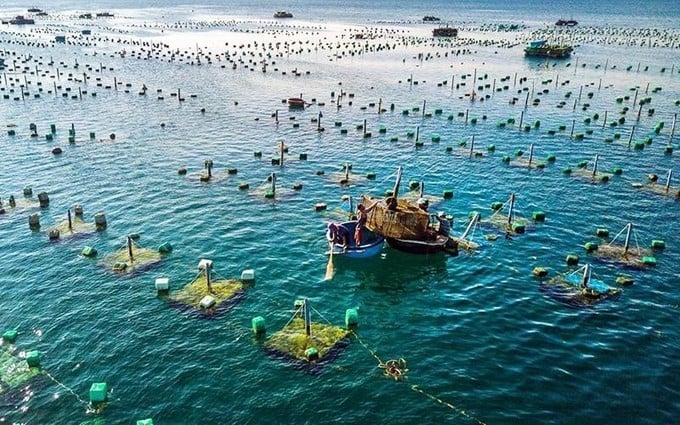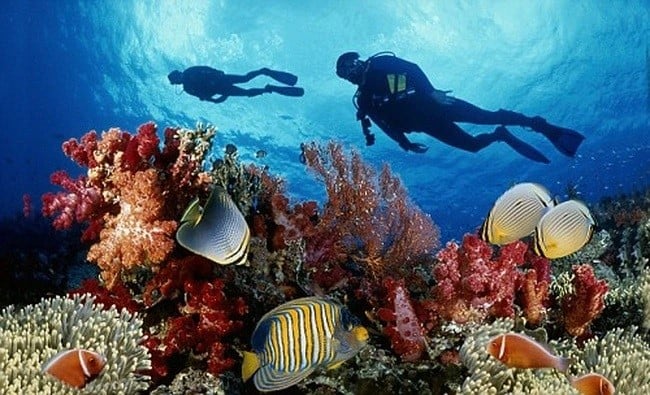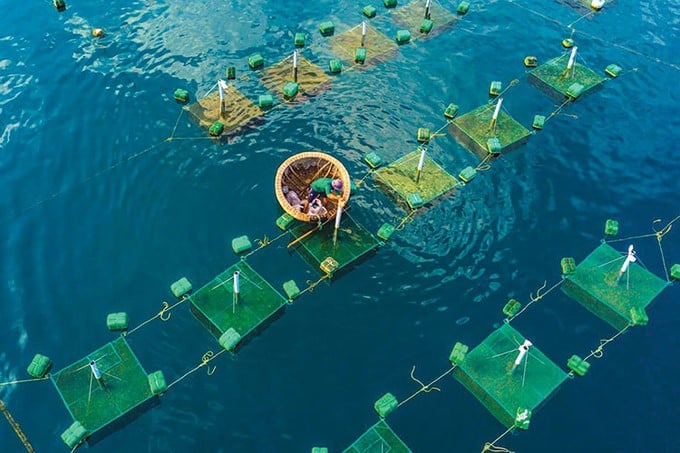May 21, 2025 | 05:38 GMT +7
May 21, 2025 | 05:38 GMT +7
Hotline: 0913.378.918
May 21, 2025 | 05:38 GMT +7
Hotline: 0913.378.918

In order to develop a model of marine aquaculture associated with marine ecotourism, the community needs to take specific, practical, and urgent actions.
Marine aquaculture associated with marine ecotourism is one of the solutions to realizing the Prime Minister’s strategic goal of seaculture development by 2030, with a vision to 2045 (Decision 1664/QD-QD-TTg, dated October 4, 2021), and the Action Plan of the Ministry of Agriculture and Rural Development (Decision 1195/QD-BNN-TCTS, dated April 4, 2022).
The particular goal is to remove conflicts of interest in marine space. The conflicts occur in the relationships between: (1) fishermen in competition for marine space; (2) fishermen and coastal communities due to environmental pollution; (3) the marine aquaculture sector with other marine economic sectors, including marine ecotourism.
When mentioning the "Story of Marine Farming", Minister of Agriculture and Rural Development Le Minh Hoan said, "The marine aquaculture industry needs to give opportunities to one community while not depriving opportunities of another community".
In order to achieve such a goal, from the point of vierw of a scientist on aquaculture, Dr. Vo Van Nha shared some comments about this matter.
It is well known that marine aquaculture (or marine farming) is just one of many sub-sectors of the marine economy. Therefore, why don't we think of combining or deepen the bond with other sectors, such as marine ecotourism, to add value for marine aquaculture?
If we can think of it that way, it means we have been able to change our mindsets and perceptions about marine farming. And the change here means the transformation from single-disciplinary mindset into multi-disciplinary mindset. Integrated thinking will create an integrated development space, and an integrated space will create integrated value.
We need to approach the agricultural economy in a multi-dimensional, multi-use, multi-functional, and multi-valued direction. We have known that the combination of agriculture and tourism in Quang Nam, Dong Thap, or Bac Ninh has brought high value to farmers. Associating marine farming with marine ecotourism will certainly bring more economic efficiency and hope when we invest in this integrated model.

Combining marine farming with marine ecotourism will certainly increase economic efficiency.
In order to develop a model of marine aquaculture associated with marine ecotourism, the seaculture community needs to take specific, practical, and urgent actions as follows:
Firstly, change from a spontaneous, single, and fragmented development mindset to a collaborative and closely linked mindset; know about "joint buy - joint sell" to save on production costs, know to produce what the market needs, not what you have. The mindset of collaboration and close linkage also creates favorable conditions for transferring science and technology, managing farming areas with digital technology, and solving environmental problems. It is a condition to develop the market and build the brand of community-made products.
Secondly, understand and make full use of the sea village’s identity, culture and signature fishing method. Be proud of yourself, your profession, and your hometown; consider these as valuable "assets" for marine farming associated with marine ecotourism.
Thirdly, understand and spend more time on studying tourists’ interests of entertainment . It is necessary to know how to observe and understand the tourists' psychology and needs, such as their desire to experience a wholehearted, thoughtful, simple service with a full sense of gratitude.
Fourthly, know how to pay attention and take great care of even the smallest things; put great efforts into learning communication and behavior skills; maintain a culturally civilized and polite lifestyle; acquire knowledge of seeds and farming techniques, the care and management of food, the environment, and diseases in farmed marine products. This requires guidance, training, and more opportunities to connect businesses and travel associations.
Fifly, mobilze financial resources to invest in infrastructure for the model of marine aquaculture associated with marine ecotourism. As for this matter, the state should have policies to encourage and provide low-interest loans to marine farming community in accordance with this integrated model.

Lobster farming in Phu Yen.
There is this saying “If you want to go fast, go alone; if you want to go far, go together”. The integrated model’s sustainable development requires high consensus and support, as well as the spirit of cooperation, sincere sharing, faith, perseverance, determination, and commitment of the marine farming community to preserve the clean environment and landscape as well as hometown’s cultural beauty.
Translated by Huyen Vu

(VAN) Japan's grant aid project contributes to capacity building, promoting organic agricultural production, and fostering sustainable community development in Dong Thap province.

(VAN) For years, the CRISPR-Cas9 genome technology has been reshaping genetic engineering, a precision tool to transform everything from agriculture to medicine.

(VAN) Vietnam aims to become a 'leader' in the region in the capacity and managing effectively soil health and crop nutrition.
![Reducing emissions from rice fields: [Part 1] Farming clean rice together](https://t.ex-cdn.com/nongnghiepmoitruong.vn/608w/files/news/2025/05/05/z6509661417740_a647202949c539012a959e841c03e1d3-nongnghiep-143611.jpg)
(VAN) Growing clean rice helps reduce environmental pollution while increasing income, allowing farmers to feel secure in production and remain committed to their fields for the long term.
/2025/05/19/5136-1-144800_230.jpg)
(VAN) The Nghe An Provincial People's Committee has just approved the list of beneficiaries eligible for revenue from the Emission Reductions Payment Agreement (ERPA) in the North Central region for the year 2025.

(VAN) 14 out of 35 domesticated elephants in Dak Lak province have had their living conditions improved, with 11 of them currently participating in the non-riding elephant tourism model.

(VAN) Muong Nhe Nature Reserve hopes that being upgraded to a national park will lay the foundation for forest protection efforts to be carried out in a systematic, modern, and sustainable manner.